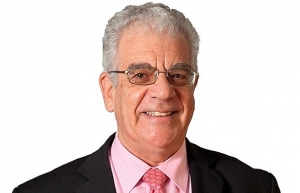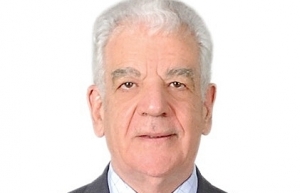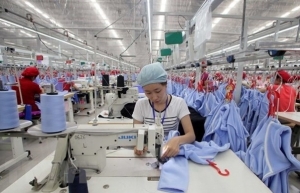I am Vietnamese, says Atkinson
 |
| Kenneth M Atkinson, chairman of the British Business Group in Vietnam |
Answering the question of why he decided to apply for Vietnamese citizenship, Atkinson said that it took him more than two years to prepare the procedures for his naturalisation registration.
"I thought it was worth it and I became one of the few foreigners to have a Vietnamese ID. This is a great thing for me,” he said.
Talking about why he took the initiative to apply for Vietnamese citizenship, Atkinson talked passionately about the country and the people of Vietnam. A peaceful but charming Hanoi with quaint street corners and French-style buildings, and a vibrant, generous, and sunny Ho Chi Minh City.
Recalling the first time he came to Vietnam, he often stayed at the Army Hotel on Pham Ngu Lao Street, Hoan Kiem District. Every day, he usually went to the Metropole hotel to work. In those early years, he had a driver take him around Hanoi on a traditional cyclo. Anh Hai was the name he later saved on his phone. Hai still drives for him every time he comes to Hanoi on business, but now by motorbike.
“Hai was like a friend. Every time I went to Hanoi, he would miraculously be waiting for me outside the hotel where I was staying. When meeting me, he would talk about what was happening in Hanoi, and in many cases, I could find out which of my friends were in Hanoi when I arrived. He knows me and knows my friends too. Hai is very nice, very friendly, and I consider him a lifelong friend,” he confided.
After more than 30 years living in Vietnam, in addition to doing business, Atkinson also participates in charitable activities. Being an easy-going and kind person, he is very fond of children and has for many years supported Operation Smile and Newborns Vietnam to help disadvantaged children and pre-term babies.
| “For me, doing something for others, especially children, is a natural thing. We need to make changes to improve people's lives and heal the wounds of children with these facial deformities, which is not difficult to do as long as we are kind-hearted,” he said. |
Therefore, the OBE award (the Order of the British Empire), to which he was recently conferred, is not surprising in recognition of his contributions to British charities and companies in Vietnam.
Doing business in Vietnam
Although he has lived and founded a consulting company in Vietnam for more than 30 years, few would have expected Atkinson to start his business in the Vietnamese market at the time of his early visit to do a feasibility study for a hotel in Hanoi.
In 1989, while running his own consulting business (PCS International in Hong Kong), Atkinson had the opportunity to conduct a feasibility study for the SAS Royal Hotel in Lenin Park in Hanoi.
It was the first time he came to Vietnam. The project faced problems because it was located on a public campus and could not be implemented, but this was the first project he participated in with partners in the Vietnamese market.
When asked if he did any research about Vietnam before deciding to live and work here, he smiled and honestly confessed to the reporter, "I knew very little."
When he was a student at a university in England, there was a war in Vietnam.
“I didn’t have much information about Vietnam, but I read many stories in the newspapers about the anti-war protest movement in the US. Around 1977-78, I worked for a bank in Hong Kong and there was a business transaction related to Vietnam. It was this information that made me quite curious about this country but it happened quite by accident,” he said.
In 1983 he set up his own consulting business, but the work was then focused almost entirely on the mainland China market, and to a small extent, in Thailand and the Philippines.
One of his clients in China, who at that time was operating a hotel chain with the current name of Radisson, asked him to come to Vietnam and do a feasibility study to build a hotel project. At the time, Atkinson was involved in several hotel projects in China. However, the historic event that took place in Tiananmen Square on June 4, 1989 changed Atkinson's mind and influenced his future plans.
“We were just a small company and the Chinese market was so big. So, I thought Vietnam would be a better opportunity for me,” he said of his chance to come to Vietnam.
After that, he came to Vietnam more often during the early 90s and it took three years to get the investment license to set up a foreign consulting company. That was in 1993. In 1994, his firm became a member of the Grant Thornton network. After that in 1998, it merged with a firm called Bourne Griffiths and adopted the name Grant Thornton. From there it further developed its tax and auditing services and became a global, full-service firm.
Although he retired in 2019, Atkinson still seems to be full of enthusiasm. Currently, he still works six days a week in positions such as vice chairman of the Vietnam Tourism Advisory Board, chairman of the British Business Group in Vietnam, and member of the Board of Directors of Nam Long Investment JSC. He also continues as an adviser to Grant Thornton and holds several directorships and advisory roles.
Chatting with Atkinson
How has Vietnam's investment environment changed over the past 30 years?
When we first entered Vietnam, there were few foreign companies operating and the legal system was still simple. I remember at that time, only a few laws such as the Foreign Investment Law, the Civil Law, and the Tax Law were being drafted. This is a rudimentary system that can be seen in most developing countries – like Vietnam at that time. Today, the law has changed a lot, it's now much more perfected.
The current legal system is also supported by a system of multilateral and bilateral free trade agreements, investment protection agreements, and more. In my opinion, Vietnam has reached a ripe point in some respects, but there are still challenges that need to be synchronised and perfected within the legal system.
What do you think about Vietnam's investment market?
I think Vietnam is an attractive investment destination, especially for manufacturers from Europe, America, and Asia. Many of them are present in Vietnam and are continuing to move and expand their production bases within the country. However, Vietnam also has a lot to do to attract top international companies, which can bring higher investment value and larger projects here. The government system also needs to be more transparent and have a higher level of governance, which is very important for multinational companies.
I also see that recently the Government of Vietnam is carrying out a series of anti-corruption activities. This is to be applauded, however, I would hope these operations can be handled in a controlled manner to avoid a domino break for the market.
Currently, Vietnam is still attracting a high level of foreign direct investment (FDI). Entering 2023 and beyond, capital flows due to geopolitical tensions in the world market will certainly continue to enter Vietnam. In particular, Vietnam's FDI attraction is being supported by a series of free trade agreements and increased productivity and efficiency in the manufacturing sector.
However, it still has to be said that the next year, or at least the first half of 2023, will be a very difficult time for many companies. This is not only happening in the Vietnamese market but also globally due to high inflation and interest rate variability. This may delay investment decisions in the short term, but we are still very optimistic about Vietnam's economic development.
What are the challenges you face consulting and auditing in Vietnam?
In the past, we have also had many disappointments when performing consulting activities in the Vietnamese market. There have been a number of times when we almost completed the investment agreement, but then for some reason, the investor could not close the project. Especially, implementing real estate projects takes a lot of time and effort, possibly up to 7-8 years, even though the project may be completely feasible.
It should be emphasised that the scale and quality of FDI investments have increased significantly in recent years. In addition, Vietnamese people's understanding of international business, finance, and accounting has also been greatly improved. Companies and investors are also changing rapidly with the flow of the market, so if you hesitate in the face of obstacles, you may miss the opportunity.
 | Ramifications of new relaxed regulations on the economy Vietnam’s development over the decades has been largely achieved thanks to foreign direct investment and technology transfer from the western world, together with training and capacity building from developed countries supported by multilateral and bi-lateral agencies. This is not meant to ignore the hunger of Vietnamese people to learn and develop themselves and the investment in education by the government, private sector, and the population as a whole. |
 | Welcoming further FDI Vietnam has demonstrated strong and stable growth in attracting foreign direct investment. Kenneth Atkinson, founder and senior board adviser at Grant Thornton Vietnam, explains how the country can push ahead even further. |
 | British expert positive about Vietnam’s growth prospect in 2021 Kenneth Atkinson, a board member of the British Chamber of Commerce Vietnam (BritCham Vietnam), told German news agency DW that he remains positive about Vietnam's overall economic growth in 2021. |
What the stars mean:
★ Poor ★ ★ Promising ★★★ Good ★★★★ Very good ★★★★★ Exceptional
Related Contents
Latest News
More News
- Wine securing a stronger foothold in Vietnamese market (June 09, 2025 | 10:50)
- Vibrant Vietnamese cuisine fit for global tastes (June 09, 2025 | 10:42)
- Vietnam can be global hot spot in 2025 (January 29, 2025 | 00:38)
- Promoting tourism and hospitality with sustainability (January 28, 2025 | 09:00)
- Vietnam centres on eco-luxury tourism and hospitality (January 28, 2025 | 02:06)
- Growth prospects for Vietnam’s event tourism in 2025 (January 28, 2025 | 01:18)
- Core values drive success at Marriott (January 24, 2025 | 16:00)
- Hoteliers to prioritise eco-luxury (January 04, 2025 | 09:00)
- Vietnam upscale tourism on the rise for 2025 (December 30, 2024 | 12:03)
- Addressing concerns can shape green hospitality (December 04, 2024 | 10:24)

 Tag:
Tag:




















 Mobile Version
Mobile Version